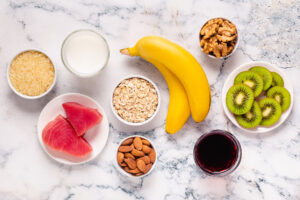Do you find yourself tossing and turning at night, counting sheep instead of getting restful sleep? While we often focus on routines, screens, and stress, your diet—especially what you eat before bed—can play a powerful role in how well you sleep.
Certain foods help the body produce melatonin (the hormone that regulates your sleep cycle) and serotonin (which promotes relaxation). The good news? Adding the right snacks to your evening routine might be just what you need for deeper, better-quality sleep.

Here are six science-backed foods that naturally support restful sleep:
- Tart Cherries
Tart cherries are one of the few fruits that naturally contain melatonin. In fact, studies have shown that consuming tart cherry juice may increase sleep duration and improve overall sleep efficiency.
How to Enjoy: Sip on a small glass of tart cherry juice in the evening, or snack on a few dried tart cherries after dinner.
- Bananas
These humble yellow fruits are more powerful than they look. Bananas are rich in magnesium and potassium—minerals that help relax your muscles—and they contain tryptophan, a precursor to both serotonin and melatonin.
Sleep Tip: Pair a banana with a spoonful of almond butter for a satisfying bedtime snack that supports relaxation.
- Almonds
Almonds are packed with magnesium and healthy fats, both of which have been linked to improved sleep. Magnesium in particular helps calm the nervous system, which can reduce anxiety and prepare the body for rest.
Evening Ritual: A small handful of almonds or a tablespoon of almond butter on whole grain toast makes a perfect pre-bed treat.
- Kiwi
Kiwis might not be your first thought when it comes to sleep aids, but research shows they’re surprisingly effective. This tropical fruit is loaded with antioxidants, vitamin C, and serotonin—all of which can help regulate sleep patterns.
Did You Know? One study found that people who ate two kiwis an hour before bed fell asleep faster and slept longer.
- Oats
Oats aren’t just for breakfast anymore. They’re a good source of melatonin and complex carbs, which help more tryptophan get to your brain. Plus, a warm bowl of oatmeal can feel soothing and help you wind down.
Before Bed Idea: Make a small serving of oatmeal topped with cinnamon and a drizzle of honey or warm milk.
- Walnuts
Walnuts are another natural source of melatonin and are also rich in healthy fats and omega-3s, which benefit brain function and reduce inflammation. Tryptophan in walnuts also boosts melatonin production.
Snack Smart: Enjoy a few walnuts on their own, or mix them into yogurt or a small serving of cottage cheese.
Food & Sleep: How to Make It Work
- Timing is key: Eat sleep-friendly foods about 1–2 hours before bedtime.
- Keep portions light: Avoid heavy meals or spicy foods late at night, which can disrupt digestion and sleep.
- Be consistent: Just like your bedtime, your eating habits affect your sleep over time—consistency matters.

Something to Keep in Mind
Just like every other part of our lifestyle, the way we eat plays a big role in our overall well-being. Including more sleep-friendly foods—like tart cherries, kiwis, walnuts, and milk—can improve both how well you sleep and how long you stay asleep.
These foods are rich in sleep-supporting compounds like melatonin, serotonin, and antioxidants. The best part? They’re easy to add to your routine—toss them into your dinner or enjoy them as a bedtime snack. Consistency is key, and even small changes like this can lead to meaningful benefits.
Final Word: Eat to Sleep
Improving your sleep might be as simple as a few tasty changes to your evening routine. While no single food is a cure-all for insomnia, the right nutrients can nudge your body in the right direction—toward deeper, more restorative rest.
So next time you’re craving a late-night snack, skip the chips and reach for one of these naturally sleep-enhancing bites. Your body—and your dreams—will thank you.
Source of information: The medical and health-related content on this website is based on information sourced from trusted platforms including WebMD, MedlinePlus (U.S. National Library of Medicine), the U.S. Food and Drug Administration (FDA), and Healthline.com. These sources are regularly consulted to ensure the accuracy and reliability of the information provided. However, this content is for informational purposes only and should not be considered a substitute for professional medical advice, diagnosis, or treatment.











